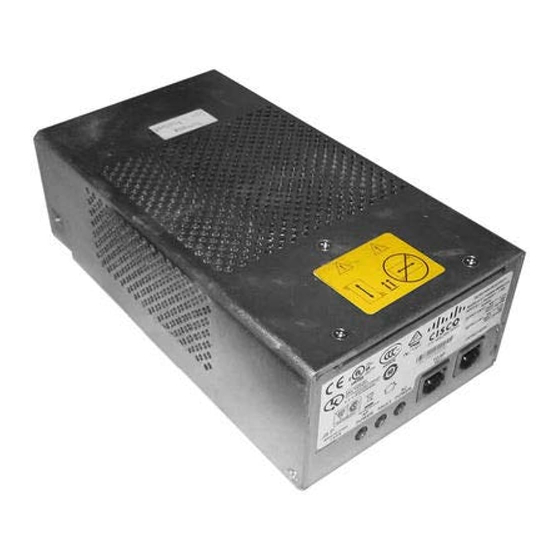Cisco Aironet 1520 Series Başlangıç Kılavuzu - Sayfa 15
Kablosuz Erişim Noktası Cisco Aironet 1520 Series için çevrimiçi göz atın veya pdf Başlangıç Kılavuzu indirin. Cisco Aironet 1520 Series 37 sayfaları. Outdoor mesh access point
Ayrıca Cisco Aironet 1520 Series için: Donanım Kurulum Kılavuzu (50 sayfalar), Manuel (27 sayfalar)

Cable Option
The factory-orderable cable option provides a cable modem and Power-over-Cable capabilities for the
access point for high-speed data transfer and Internet access. When the cable option is installed, the
access point uses its F-type cable connection to receive both data and power. Data is passed between
wireless clients on the mesh network to the cable company's network via the access point's internal
cable modem. In this configuration, the access point receives operating power from the cable. For
detailed installation information, see the Cisco Aironet 1520 Series Outdoor Access Point Hardware
Installation Guide. Configuration information can be found in the controller configuration guide of
the controller you are using.
Fiber Option
Warning
Class 1 laser product. Statement 1008
The factory-orderable fiber option provides a fiber input and output capability. Fiber is data is
transmitted and received over a single-strand fiber cable which is connected to the access point using
a rugged 100BASE-BX10-U fiber small factor pluggable (SFP) module. For convenience, two fiber
connections are available on the access point. One connection is on the bottom of the unit (shown on
Figure 1) and the other on the left side (shown on Figure 2). Client data is passed to the network
controller through the fiber connection via a fiber capable switch. For detailed installation information
about the fiber option, see the Cisco Aironet 1520 Series Outdoor Mesh Access Point Hardware
Installation Guide. Configuration information can be found in the controller configuration guide of
the controller you are using.
5
Network Deployment Examples
The access point is a wireless device designed for wireless client access and point-to-point bridging,
point-to-multipoint bridging, and point-to-multipoint mesh wireless connectivity. The access point
provides 5-GHz backhaul capability to link with another access point to reach a wired network
connection or to provide repeater operations for other access points.
The access point plays two primary radio roles: a root access point (hereafter called a RAP) or a
non-root access point (hereafter called a MAP), which is the default role of all access points. When the
access point has a wired Ethernet or cable connector connection to the controller (through a switch),
the radio role is called a RAP. In order to be considered a RAP, the access point must be configured as
a RAP. A RAP is a parent node to any bridging or mesh network. A controller can support one or more
15
